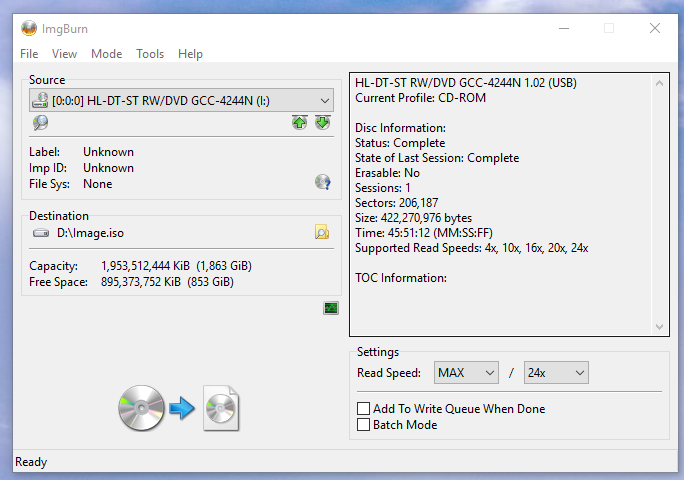Ps1 Bin Cue To Iso
Emulating games is fun, but while SNES, NES and Genesis games are easy to find and run, PlayStation games are a bit more complicated. Unlike the others, they come in a dozen of different disc formats.
A BIN file with the.bin suffix is a binary file. This is generally a raw byte for byte copy of the original file, like a clone of the original disk or file. Every bit and every byte in the same place as the original. For more complicated programs and even some games, they may be downloaded as.bin files and then converted. Get your PS1 ISO This is one of the simplest steps, just pop your disk in your CD drive, open up your selected ripping software and rip to either ISO or Bin/CCD format. The ripping software I personally use is Alcohol 52% which has a Playstation template for its ripping so it will read and dump all data. PSX ISOs (5134) NDS ROMs (6294) MAME ROMs (34305) GCN ISOs (1342) SNES ROMs (3484) GBA ROMs (2647) NES ROMs (2774) N64 ROMs (787) View All Sections; Consoles. DC ISOs (1076) GCN ISOs (1342) Genesis ROMs (1659) N64 ROMs (787) NES ROMs (2774) PCECD ISOs (509) PS2 ISOs (4078) PSX ISOs (5134) Saturn ISOs (1296) SNES ROMs (3484) View All Sections.
Most commonly, you'll find PlayStation games distributed as a zip-file and inside you'll find one or more bin files. Each bin-file represents a track on the game CD-ROM. From my experience, the first track is always data and any subsequent tracks are audio - at least for PlayStation 1 games. Unfortunately, emulators and virtual drive managers won't load multiple tracks automatically. They need something called a cue sheet, which is a special textfile that works as a tracklist. It's supposed to represent a CD-ROM and define which tracks are on the CD-ROM, which order, what format they are (data or audio) and the filename of the bin file for each track.
Given the importance of this cue sheet, it's sad how distributors of roms often forget to generate/include the file (or include an invalid one). For ePSXe, it seems that you can load the first bin directly, but background music will be missing and you'll be disappointed. 😞
With a little technical skill and a great deal of patience you can write suitable cue-files yourself for each of your games in notepad, but it's errorprone, boring and it can be automated. So guess what.. I wrote the script, so you don't have to! 😊
Prior to making this webpage, I found a few existing tools that attempt to solve this issue. I tried three different ones - Thorst's CueMaker, Liors Cue Maker 2.4 and Lior's Cue Maker unknown version. Unfortunately, neither of the tools seem to support games with multiple bin files and since these games are the ones that won't have music without a cue sheet, these tools don't really solve the problem.
This webpage also assumes that the first track is data, while all subsequent tracks are audio. This assumption seems to hold true for every PlayStation game I have tried so far.
Drag your bin files onto the dropzone below and have the cue sheet generated automatically. Your files will not be uploaded or anything. The dropzone is used to read the filenames of the bins, so this webpage can generate a cue sheet for you.

Sometimes you need to make an iso image out of a .bin file, where you usually use bchunk (binchunker).
To get binchunker, type the following command :
sudo apt-get install bchunk
now to use is it , either:
(1) You have the .cue file ,then you just type the following command :
bchunk filename.bin filename.cue filename
(2)Or, If you don’t have the .cue file, .cue file usually contains the track layout information, and it only contains the following lines :
FILE ”BinFileName.bin” BINARY
TRACK 01 MODE1/2352
INDEX 01 00:00:00

Where MODE1 , is the track mode when it is a computer cd, and MODE2 if it is a PlayStation cd.
you can write a one file of shell script to do all of this foe you , just make a new file :
gedit biniso &
Paste the following lines,(you can always use the ampersand at the end of your command to keep the acess to your command line , you don’t need to open a new shell. It is very useful when you run programs from the terminal like “sudo nautilus”, or “mathematica” ):
echo FILE ”$1.bin” BINARY >> $1.cue
echo TRACK 01 MODE1/2352 >> $1.cue
echo INDEX 01 00:00:00 >> $1.cue
bchunk $1.bin $1.cue $1_
rm $1.cue
Where the first three lines are to write the .cue file, the fourth line is the bchunk conversion command ,and the last line is to remove the .cue file.
Save and close , make it executable:
Ps1 Bin Cue To Iso 9001
sudo chmod a+x biniso
Download dhaka vice city for android. Now all what you need to do is to run the following command:./biniso binfilename
You can also place your biniso file in the /usr/local/bin, in the following way :
sudo mv biniso /usr/local/bin
where if you do so you can access it from any path , but the run command is a little different :
biniso binfilename
By now , most probably you have your iso image, you can either burn it , or mount it.
Create Iso From Bin Cue
To mount it, first make a directory for the iso image to be mounted to :
sudo mkdir /media/iso
Then you mount the image :sudo mount -t iso9660 isofilename /media/iso -o loop
To unmount it :
sudo umount /media/iso
Notice that the unmount command is umount with no n.
Source: Linux Lab